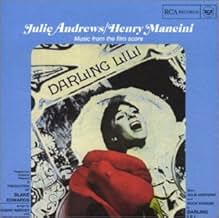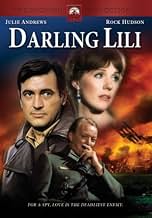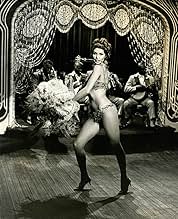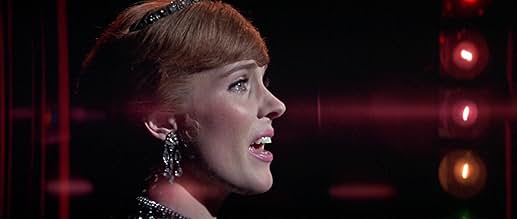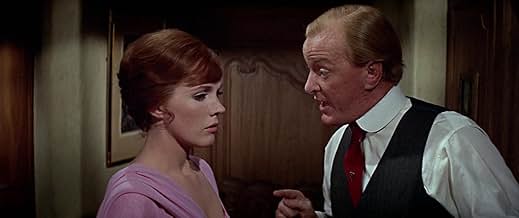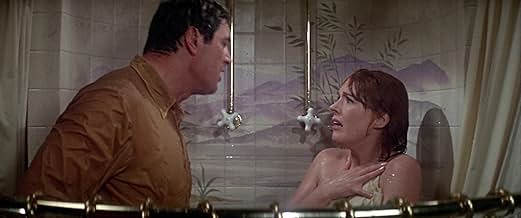CALIFICACIÓN DE IMDb
6.0/10
2.6 k
TU CALIFICACIÓN
Ambientada durante la Primera Guerra Mundial, esta película es una linda versión de la leyenda de Mata Hari.Ambientada durante la Primera Guerra Mundial, esta película es una linda versión de la leyenda de Mata Hari.Ambientada durante la Primera Guerra Mundial, esta película es una linda versión de la leyenda de Mata Hari.
- Dirección
- Guionistas
- Elenco
- Nominado a 3 premios Óscar
- 1 premio ganado y 7 nominaciones en total
Arthur Gould-Porter
- Sergeant Wells
- (as A.E. Gould-Porter)
David Armstrong
- Squadron Pilot
- (sin créditos)
Yves Barsacq
- French General
- (sin créditos)
- Dirección
- Guionistas
- Todo el elenco y el equipo
- Producción, taquilla y más en IMDbPro
Opiniones destacadas
Except for "Star!", (Which another reviewer understandably considers a "companion piece" to this film), Julie Andrews never starred in a film that was more ideally structured specifically for her many talents than "Darling Lilli." She gets to sing, act, look lovely, even let her hair down and do a striptease in her continuing efforts to get away from her Mary Poppins/Maria Von Trapp image, and much more. Lilli is certainly one of the most interesting characters she ever played; you're never quite sure whether you're supposed to root for or despise this half-English, half-German who is a London music-hall entertainer but also acting as a spy for the Fatherland in World War I and is sent to, um, extract military secrets from American Major William Larabee but falls in love with him and tries to clear both their names for the suspicious French government.
And like "Star!", "Darling Lilli" was released at the wrong time. It had enough "performance numbers" to count as a movie musical, even though it also had elements of drama, comedy, and spy intrigue, and both movie musicals and Julie Andrews were not what critics and audiences were anxious to see in the late 1960s and early 70s, when both films were released. So both bombed at the box office. "Darling Lilli" in particular, judging by the "director's cut" that director Blake Edwards prepared several years later, did not really deserve this fate. While flawed, it is still highly entertaining, and Miss Andrews is utterly radiant, whether acting, stripping, or singing some vintage WW I tunes or some lovely songs written for the film by Henry Mancini and Johnny Mercer. The film should be seen if for no other reason than for the hauntingly beautiful "Whistling Away the Dark" and Julie's tender, achingly vulnerable performance of it.
But as I said, the film itself is not too great. The description of Lilli's character alone is confusing enough, and often it's hard to figure out what is going on. (Perhaps some footage that could've cleared up this confusion is in the original version of the film?) In addition to the rather muddled string of events, Rock Hudson is pretty stiff as Larabee, and the various German, French, and English accents of the supporting characters come and go. The authentic WW I aircraft is cool, but the air sequences, appaarently the ones that took the longest time out of the film's very long shooting period, are the least interesting in the film. And another reviewer also noted the film's uneasy yo-yoing between genres: the "director's cut" is probably the most serious film Edwards (Who happened to have just married Miss Andrews before they started filming this) ever directed, but he can't resist putting in some of his trademark cheap laughs, although several of them are admittenly funny. And all in all, the film is very entertaining, whether as a drama, comedy, musical, or spy thriller, and whenever Julie Andrews is onscreen, all the film's faults seem like quibbles. Obviously, Mr. Edwards is in love with his wife; can you blame him?
And like "Star!", "Darling Lilli" was released at the wrong time. It had enough "performance numbers" to count as a movie musical, even though it also had elements of drama, comedy, and spy intrigue, and both movie musicals and Julie Andrews were not what critics and audiences were anxious to see in the late 1960s and early 70s, when both films were released. So both bombed at the box office. "Darling Lilli" in particular, judging by the "director's cut" that director Blake Edwards prepared several years later, did not really deserve this fate. While flawed, it is still highly entertaining, and Miss Andrews is utterly radiant, whether acting, stripping, or singing some vintage WW I tunes or some lovely songs written for the film by Henry Mancini and Johnny Mercer. The film should be seen if for no other reason than for the hauntingly beautiful "Whistling Away the Dark" and Julie's tender, achingly vulnerable performance of it.
But as I said, the film itself is not too great. The description of Lilli's character alone is confusing enough, and often it's hard to figure out what is going on. (Perhaps some footage that could've cleared up this confusion is in the original version of the film?) In addition to the rather muddled string of events, Rock Hudson is pretty stiff as Larabee, and the various German, French, and English accents of the supporting characters come and go. The authentic WW I aircraft is cool, but the air sequences, appaarently the ones that took the longest time out of the film's very long shooting period, are the least interesting in the film. And another reviewer also noted the film's uneasy yo-yoing between genres: the "director's cut" is probably the most serious film Edwards (Who happened to have just married Miss Andrews before they started filming this) ever directed, but he can't resist putting in some of his trademark cheap laughs, although several of them are admittenly funny. And all in all, the film is very entertaining, whether as a drama, comedy, musical, or spy thriller, and whenever Julie Andrews is onscreen, all the film's faults seem like quibbles. Obviously, Mr. Edwards is in love with his wife; can you blame him?
In an odd, comic take on Mata Hari's legendary fame, Julie Andrews stars as a well-loved British entertainer who seduces military leaders and passes on their secrets to the Germans. This movie doesn't take itself too seriously, so feel free to just tap your toe and enjoy Julie's fun musical numbers. It's also a Blake Edwards movie, so you can expect to be entertained by quick comedy and superb comic timing. In a famous scene, Rock Hudson gets so mad, he barges in on Julie Andrews in the shower to continue their argument.
In one of my favorite scenes, Julie has been tasked with delaying Rock at her house. She puts on a large act of seduction, but in order to stretch things out, she insists on getting literally swept off her feet. Rock struggles to pick her up and carry her through the rooms, since she continues to kiss him and pretends to be so engrossed in her task she doesn't know he's having trouble. It's pretty funny, as is much of the movie. The very best scene, though, is hands down the striptease. Julie gets jealous of Rock's other paramour Gloria Paul. Gloria's a stripper, and Julie watches a risqué dance, then recreates it onstage in her next performance! You won't be able to believe it until you see it: Julie Andrews bumping, grinding, and taking her dress off. I thought it was fantastic, and it almost earned her a Hot Toasty Rag nomination; but there were lots of heavy, dramatic performances that year and she didn't make it on the list.
You'll get to hear lots of fun songs that put you back in the wartime mood, and Henry Mancini's Oscar- and Rag-nominated "Whistling in the Dark" opens the film. And with two pretty people in the leads, and lots of smooching, you're in for an enjoyable, funny evening.
In one of my favorite scenes, Julie has been tasked with delaying Rock at her house. She puts on a large act of seduction, but in order to stretch things out, she insists on getting literally swept off her feet. Rock struggles to pick her up and carry her through the rooms, since she continues to kiss him and pretends to be so engrossed in her task she doesn't know he's having trouble. It's pretty funny, as is much of the movie. The very best scene, though, is hands down the striptease. Julie gets jealous of Rock's other paramour Gloria Paul. Gloria's a stripper, and Julie watches a risqué dance, then recreates it onstage in her next performance! You won't be able to believe it until you see it: Julie Andrews bumping, grinding, and taking her dress off. I thought it was fantastic, and it almost earned her a Hot Toasty Rag nomination; but there were lots of heavy, dramatic performances that year and she didn't make it on the list.
You'll get to hear lots of fun songs that put you back in the wartime mood, and Henry Mancini's Oscar- and Rag-nominated "Whistling in the Dark" opens the film. And with two pretty people in the leads, and lots of smooching, you're in for an enjoyable, funny evening.
Recognized with three Oscar nominations Darling Lili was a big flop at the time and helped seal the fate of big budget musicals and Julie Andrews's career in them. They were getting just too expensive to make with all the talent that used to be under contract to a studio now charging full market value for services. Whatever else Darling Lili is it's a full market value musical film.
Set in the era of World War I, Darling Lili's best asset is its music. Two of the three nominations were in the music field for best overall score and to Henry Mancini and Johnny Mercer for the song Whistling In The Dark. That one is an incredibly beautiful number that Julie Andrews sings perfectly. The original songs are integrated so well into the film that they fit perfectly in the era. More traditional World War I era songs are also used, no doubt all in the public domain by 1970.
Would that the score was attached to a better story. Wholesome Julie Andrews is a popular entertainer of the era, singing for the troops on the western front. She also doubles as a German spy. Her assignment which she accepts with gusto is to get involved with American air ace Rock Hudson and learn some military secrets. I think you can guess the rest.
Darling Lili lurches back and forth from cloak and dagger espionage to slapstick comedy in the extreme and it's an uncomfortable ride in the process. One of the characters is Lance Percival playing a drunken pilot in the Royal Flying Corps. I mean really, this guy should never have been in the RFC, the comedy which is good is severely out of place.
Film buffs will recognize some similarity to The Firefly and the British classic Dark Journey so if you know those films you know how this one ends. Fans of Rock Hudson and of Julie Andrews will like this and her singing is divine. The rest of Darling Lili is on a lesser plain.
Set in the era of World War I, Darling Lili's best asset is its music. Two of the three nominations were in the music field for best overall score and to Henry Mancini and Johnny Mercer for the song Whistling In The Dark. That one is an incredibly beautiful number that Julie Andrews sings perfectly. The original songs are integrated so well into the film that they fit perfectly in the era. More traditional World War I era songs are also used, no doubt all in the public domain by 1970.
Would that the score was attached to a better story. Wholesome Julie Andrews is a popular entertainer of the era, singing for the troops on the western front. She also doubles as a German spy. Her assignment which she accepts with gusto is to get involved with American air ace Rock Hudson and learn some military secrets. I think you can guess the rest.
Darling Lili lurches back and forth from cloak and dagger espionage to slapstick comedy in the extreme and it's an uncomfortable ride in the process. One of the characters is Lance Percival playing a drunken pilot in the Royal Flying Corps. I mean really, this guy should never have been in the RFC, the comedy which is good is severely out of place.
Film buffs will recognize some similarity to The Firefly and the British classic Dark Journey so if you know those films you know how this one ends. Fans of Rock Hudson and of Julie Andrews will like this and her singing is divine. The rest of Darling Lili is on a lesser plain.
It was 1970. Julie Andrews had hit her highs onscreen, and her star was starting to fade, at least in the public's eye. "Lili" represented another opportunity for Julie to change her image, coming right after the megamusical "STAR!" which didn't deserve the drubbing *it* received either.
Audiences didn't seem to care for this WWI musical drama. In fact, they were staying away in droves from ANY musical--drama or not.
The shame of it all is that this film, with its many classic moments, was stigmatized by the press who were gunning for Our Fair Julie and her new beau, writer/director/producer Blake Edwards.
But "Lili" really *is* worth seeking out. Julie sings beautifully, especially the haunting "Whistling Away the Dark," a lovely Henri Mancini tune that opens and closes the film. Her performance is nuanced and quite affecting--just watch her as a fat tear silently slides down her cheek after a tumultuous argument with Major Larabee.
Edwards has staged some stunning flight sequences, but the suffer somewhat, in 1990s sensibilities, from the blue-screen process shots needed to get Rock "into" midair. Edwards also can't seem to help himself from sliding into formulaic comedy bits (he apparently thinks a bumbling Frenchman with an umbrella on a roof in a rainstorm is hilarious--it shows up in film after film of his).
The reason to watch "Lili" is for its interesting spin on the Mata Hari legend and the performance of Miss Andrews, who certainly didn't deserve the brickbats that came her way following its release.
Audiences didn't seem to care for this WWI musical drama. In fact, they were staying away in droves from ANY musical--drama or not.
The shame of it all is that this film, with its many classic moments, was stigmatized by the press who were gunning for Our Fair Julie and her new beau, writer/director/producer Blake Edwards.
But "Lili" really *is* worth seeking out. Julie sings beautifully, especially the haunting "Whistling Away the Dark," a lovely Henri Mancini tune that opens and closes the film. Her performance is nuanced and quite affecting--just watch her as a fat tear silently slides down her cheek after a tumultuous argument with Major Larabee.
Edwards has staged some stunning flight sequences, but the suffer somewhat, in 1990s sensibilities, from the blue-screen process shots needed to get Rock "into" midair. Edwards also can't seem to help himself from sliding into formulaic comedy bits (he apparently thinks a bumbling Frenchman with an umbrella on a roof in a rainstorm is hilarious--it shows up in film after film of his).
The reason to watch "Lili" is for its interesting spin on the Mata Hari legend and the performance of Miss Andrews, who certainly didn't deserve the brickbats that came her way following its release.
Blake Edwards' "Darling Lili" is not a great film, but it is better than most people give it credit for. One of the most maligned productions in history (the aerial sequences took 2 years to film, the budget swelled to 3 times the original budget, various cuts of the film only add to the muddle), my final analysis is this: an underrated film whose reputation should soar once it's more widely seen.
This film exists in three versions: the original roadshow version (190 minutes)which Edwards disowned, the general release version (136 minutes)and Edwards' personal director's cut (113 minutes).
Tones shift between versions. The roadshow version had more talky sequences and was a numbing bore. The general release version deleted these sequences and was an improvement, but was still missing something. Edwards' cut was a great improvement. It is more serious in tone than the previous cuts, but the story concucted by Edwards and William Peter Blatty benefits from that approach. Julie Andrews is simply great as Lili, the singer/spy and her singing is at an all time high. Rock Hudson is excellent as her American pilot lover. Only after his inclination was exposed, did people take him seriously as an actor. But he was great all along. The songs by Henry Mancini and Johnny Mercer are strong as is the cinematography (by Russell Harlan, in Panavision)
Sadly, "Darling Lili" is not available on tape or DVD. But luckily for us, AMC shows this very often.
Roadshow version: 1/2* General Release: ** 1/2 Director's Cut: ***1/2
This film exists in three versions: the original roadshow version (190 minutes)which Edwards disowned, the general release version (136 minutes)and Edwards' personal director's cut (113 minutes).
Tones shift between versions. The roadshow version had more talky sequences and was a numbing bore. The general release version deleted these sequences and was an improvement, but was still missing something. Edwards' cut was a great improvement. It is more serious in tone than the previous cuts, but the story concucted by Edwards and William Peter Blatty benefits from that approach. Julie Andrews is simply great as Lili, the singer/spy and her singing is at an all time high. Rock Hudson is excellent as her American pilot lover. Only after his inclination was exposed, did people take him seriously as an actor. But he was great all along. The songs by Henry Mancini and Johnny Mercer are strong as is the cinematography (by Russell Harlan, in Panavision)
Sadly, "Darling Lili" is not available on tape or DVD. But luckily for us, AMC shows this very often.
Roadshow version: 1/2* General Release: ** 1/2 Director's Cut: ***1/2
¿Sabías que…?
- TriviaA very troubled production, this movie went way over budget and was a box-office flop when released. Director Blake Edwards used the experience of making this movie as the inspiration for the script to S.O.B. (1981).
- ErroresIn the "Cafe Can Can" scene the World War I American pilots are said to belong to an "Eagle Squadron" but that term was only used for Americans flying with the RAF in World War II.
- Citas
Lili Smith: But then, why *does* he drink?
Maj. William Larrabee: Because he's afraid to fly.
Lili Smith: Then why does he fly?
Maj. William Larrabee: Because he likes to drink!
- Créditos curiososThe Paramount Pictures logo does not appear in the beginning of the film, only at the end of the film.
- Versiones alternativasTwo decades after its original release, director Blake Edwards re-cut the film for the TNT network, shortening it by 22 minutes and dramatically changing its tone. This so-called "director's cut" runs 114 minutes.
- ConexionesFeatured in Entertainment This Week Salutes Paramount's 75th Anniversary (1987)
- Bandas sonorasLa Marseillaise
by Claude Joseph Rouget de Lisle
Special French Lyrics Translations by Danielle Mauroy and Michel Legrand
Selecciones populares
Inicia sesión para calificar y agrega a la lista de videos para obtener recomendaciones personalizadas
- How long is Darling Lili?Con tecnología de Alexa
Detalles
- Fecha de lanzamiento
- País de origen
- Idiomas
- También se conoce como
- Darling Lili: Or Where Were You the Night You Said You Shot Down Baron von Richtofen
- Locaciones de filmación
- Productora
- Ver más créditos de la compañía en IMDbPro
Taquilla
- Presupuesto
- USD 25,000,000 (estimado)
- Tiempo de ejecución2 horas 16 minutos
- Relación de aspecto
- 2.35 : 1
Contribuir a esta página
Sugiere una edición o agrega el contenido que falta

Principales brechas de datos
By what name was Darling Lili (1970) officially released in India in English?
Responda

